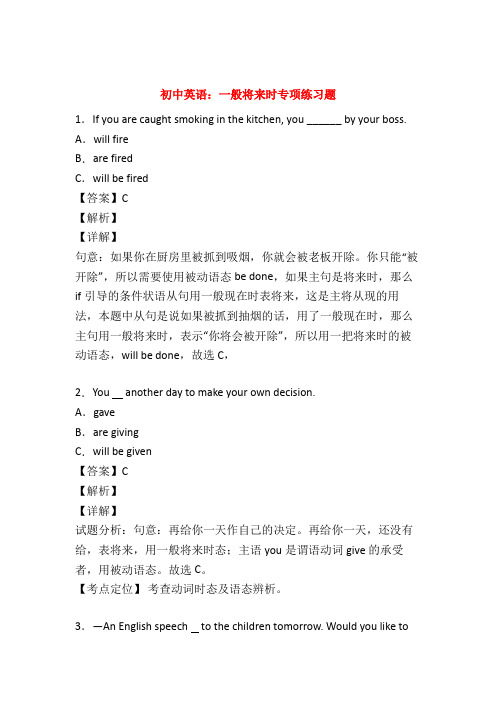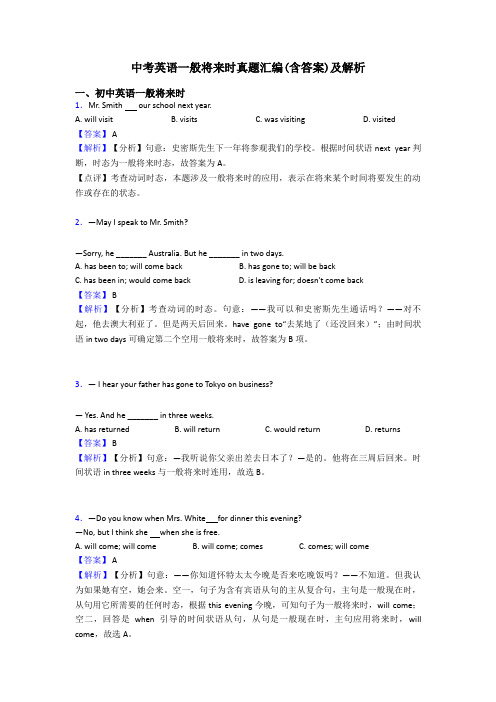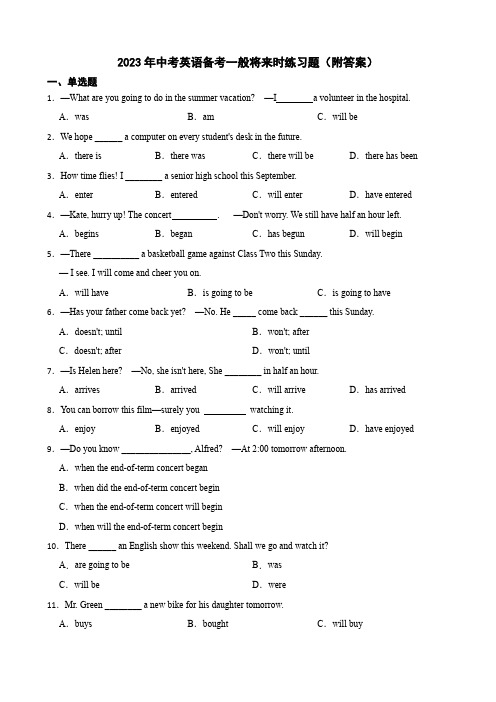一般将来时中考真题
【整理】中考英语一般将来时专项练习(附答案)50题

初中英语:一般将来时专项练习题1.--There aren’t any libraries in our town, are there ? --No, but it is said one _____ next year.A.will be built B.is built C.will build【答案】A【解析】【详解】解析:句意:——我们镇上没有图书馆,是吗?——是的,但是据说明年将会修建一个。
由句中时间状语next year可知是一般将来时,且library与build之间是被动关系。
故答案选A。
点睛:通过观察句子结构可知it is said one_____next year为含有主语从句的复合句,其中主句 it is said 是一般现在时,从句可以用所需要的时态,根据时间状语next year表示一个将来的时间,故从句的时态为一般将来时,再根据从句的主语为one代指上文中的library是谓语动词build的承受者,二者形成被动关系,故用被动语态,所以谓语动词为一般将来时的被动语态,其结构为will+be+及物动词的过去分词,build的过去分词为built。
故答案选A。
2. ---What can I do for you?---I’m looking for the new CD by Li Jian.---Good taste,and only a few left.I believe the CDs you ask for out soon.A.being sold B.is soldC.will be sold D.was selling【答案】C【解析】【详解】试题分析:句意:――我能为你做什么吗?――我正在寻找李建的新唱片。
――好品味,仅剩几张了,我相信你要的唱片很快会被卖光的。
根据soon可知,应该用将来时。
当主语是动作的承受者时,用被动语态。
结合句意,故选C考点:考查一般将来时的被动语态。
(英语)中考英语一般将来时试题(有答案和解析)

(英语)中考英语一般将来时试题(有答案和解析)一、初中英语一般将来时1.—Do you know ______?—The day after tomorrow.A. when we visited the museumB. when we will visit the museumC. when did we visit the museumD. when will we visit the museum【答案】 B【解析】【分析】句意:——你知道我们什么时候参过博物馆吗?——后天。
Do you know 后接宾语从句,应使用陈述结构,因此排除C和D,根据答语The day after tomorrow.可知问句使用一般将来时,故答案是B。
【点评】考查宾语从句的语序各时态,注意宾语从句使用陈述语序,根据答语确定问句的时态。
2.— I hear your father has gone to Tokyo on business?— Yes. And he _______ in three weeks.A. has returnedB. will returnC. would returnD. returns【答案】 B【解析】【分析】句意:—我听说你父亲出差去日本了?—是的。
他将在三周后回来。
时间状语in three weeks与一般将来时连用,故选B。
3.I don't know whether mom _________ me to Beijing next week.A. takeB. takesC. will takeD. would take【答案】 C【解析】【分析】句意:我不知道妈妈下周是否会带我去北京。
分析句子结构可知,此处是宾语从句,主句时态为一般现在时,从句时态根据主现从任原则,再根据从句中的next week可知,从句应该是表示将来的动作,所以用一般将来时,用will do形式,故选C。
优选最新中考英语一般将来时练习题及答案

初中英语:一般将来时专项练习题1.If you are caught smoking in the kitchen, you ______ by your boss. A.will fireB.are firedC.will be fired【答案】C【解析】【详解】句意:如果你在厨房里被抓到吸烟,你就会被老板开除。
你只能“被开除”,所以需要使用被动语态be done,如果主句是将来时,那么if引导的条件状语从句用一般现在时表将来,这是主将从现的用法,本题中从句是说如果被抓到抽烟的话,用了一般现在时,那么主句用一般将来时,表示“你将会被开除”,所以用一把将来时的被动语态,will be done,故选C,2.You another day to make your own decision.A.gaveB.are givingC.will be given【答案】C【解析】【详解】试题分析:句意:再给你一天作自己的决定。
再给你一天,还没有给,表将来,用一般将来时态;主语you是谓语动词give的承受者,用被动语态。
故选C。
【考点定位】考查动词时态及语态辨析。
3.—An English speech to the children tomorrow. Would you like togo?—Sure.A.gives B.is given C.will be given D.will give【答案】C【解析】【详解】句意:明天将给孩子们做一次英语演讲。
你想要去吗?—当然。
根据主语An English speech发不出谓语give的动作,所以要用被动语态,排除A和D,由所给空后面的tomorrow可知,应该用一般将来时的被动语态,故答案选C。
4.Shijingshan Joy City in 2020.A.builds B.will build C.is built D.will be built 【答案】D【解析】【详解】句意:石景山欢乐城将于2020年建成。
最新中考英语一般将来时练习题及答案

初中英语:一般将来时专项练习题1.The 2022 Winter Olympic Games in Beijing.A.was held B.will be held C.is held D.will hold 【答案】B【解析】【详解】句意:2022年的冬季奥运会将在北京举行。
本题考查一般将来时的被动语态。
主语The 2022 Winter Olympic Games,为物,用被动语态,2022年将来时态,所以此题要用一般将来时的被动语态,结构是will be done,故选B。
2.—Which sport are you in at the school sports meeting?—No decision yet. I think it _______ after discussing it with Mr Zhao. A.was decided B.will be decidedC.will decide D.is decided【答案】B【解析】【详解】试题分析:句意:——校运动会上你参加什么项目?——我还没决定,我想和赵老师商量后再定。
根据句意可知还没和赵老师商量,应该用将来时;另外主语it和动词decide的关系是被动关系,此处要用将来时的被动形式,故选B.考点:考查动词时态。
3.--You know what? The graduation party ______ in our school hall on June 14th.-- Great! I’m looking forward to it!A.holds B.is held C.was held D.will be held 【答案】D【解析】【详解】句意:——你知道吗?毕业联欢会将于6月14日在我们学校的礼堂举行。
——太好了!我很期待!A. holds一般现在时;B. is held被动语态的一般现在时;C. was held 被动语态的一般过去时;D. will be held被动语态的一般将来时。
中考英语一般将来时真题汇编(含答案)及解析

中考英语一般将来时真题汇编(含答案)及解析一、初中英语一般将来时1.Mr. Smith our school next year.A. will visitB. visitsC. was visitingD. visited【答案】 A【解析】【分析】句意:史密斯先生下一年将参观我们的学校。
根据时间状语next year判断,时态为一般将来时态,故答案为A。
【点评】考查动词时态,本题涉及一般将来时的应用,表示在将来某个时间将要发生的动作或存在的状态。
2.—May I speak to Mr. Smith?—Sorry, he _______ Australia. But he _______ in two days.A. has been to; will come backB. has gone to; will be backC. has been in; would come backD. is leaving for; doesn't come back【答案】 B【解析】【分析】考查动词的时态。
句意:——我可以和史密斯先生通话吗?——对不起,他去澳大利亚了。
但是两天后回来。
have gone to“去某地了(还没回来)”;由时间状语in two days可确定第二个空用一般将来时,故答案为B项。
3.— I hear your father has gone to Tokyo on business?— Yes. And he _______ in three weeks.A. has returnedB. will returnC. would returnD. returns【答案】 B【解析】【分析】句意:—我听说你父亲出差去日本了?—是的。
他将在三周后回来。
时间状语in three weeks与一般将来时连用,故选B。
4.—Do you know when Mrs. White for dinner this evening?—No, but I think she when she is free.A. will come; will comeB. will come; comesC. comes; will come【答案】 A【解析】【分析】句意:——你知道怀特太太今晚是否来吃晚饭吗?——不知道。
2023年中考英语备考一般将来时练习题(附答案)

2023年中考英语备考一般将来时练习题(附答案)一、单选题1.—What are you going to do in the summer vacation? —I a volunteer in the hospital.A.was B.am C.will be2.We hope ______ a computer on every student's desk in the future.A.there is B.there was C.there will be D.there has been 3.How time flies! I ________ a senior high school this September.A.enter B.entered C.will enter D.have entered 4.—Kate, hurry up! The concert . —Don't worry. We still have half an hour left.A.begins B.began C.has begun D.will begin 5.—There __________ a basketball game against Class Two this Sunday.— I see. I will come and cheer you on.A.will have B.is going to be C.is going to have 6.—Has your father come back yet? —No. He _____ come back ______ this Sunday.A.doesn't; until B.won't; afterC.doesn't; after D.won't; until7.—Is Helen here? —No, she isn't here, She ________ in half an hour.A.arrives B.arrived C.will arrive D.has arrived 8.You can borrow this film—surely you watching it.A.enjoy B.enjoyed C.will enjoy D.have enjoyed 9.—Do you know _______________, Alfred? —At 2:00 tomorrow afternoon.A.when the end-of-term concert beganB.when did the end-of-term concert beginC.when the end-of-term concert will beginD.when will the end-of-term concert begin10.There ______ an English show this weekend. Shall we go and watch it?A.are going to be B.wasC.will be D.were11.Mr. Green ________ a new bike for his daughter tomorrow.A.buys B.bought C.will buy12.My family ________ in the hotel for a week next month.A.have stayed B.stayed C.stay D.will stay13.The policeman a speech on how to protect personal information next week.A.will give B.gives C.gave D.has given14.Just wait and see, Class Five ________ the basketball game.A.will win B.won C.wins D.have won 15.—Has he decided yet? —No, he hasn't. He ________ your plan carefully before he gives you a reply.A.considers B.considered C.will consider D.has considered 16.There _______________ a football match next Sunday. If it _______________, we'll have to put it off.A.is going to have; will rain B.is going to have; rainsC.is going to be; rains D.is going to be; will rain17.—Sorry, I'm afraid Dr. Johnson isn't at his office now.—Well, I ____________ him on his mobile phone instead.A.called B.has called C.will call D.is calling 18.—What's your resolution for the new year?—I ____________more part-time jobs to support my family.A.do B.does C.will do D.did19.If you take this train, you _______ in Beijing in five hours.A.arrive B.will arrive C.arrived D.has arrived 20.Thanks for letting us borrow your camera. We __________it to you next Monday.A.return B.will return C.have returned21.If you take this train, you in Shanghai in five hours.A.arrive B.will arrive C.arrived D.have arrived 22.Don't drink coffee before going to bed, or you _________easily.A.don't fall asleep B.won't fall asleepC.didn't fall asleep D.haven't fallen asleep23.—Is Helen here? —Not yet, but she______________ in half hour.A.arrives B.will arrive C.arrived D.has arrived24.In 2022,China the 24th Winter Olympics (冬奥会) in Beijing.A.held B.hold C.will hold25.—Have scientists found life on Mars?—Not yet, but I think they ___________ it some day.A.find B.found C.have found D.will find26.If you keep trying, you _____________ great progress.A.make B.made C.will make D.have made27.I my pen pal David to Baimai Spring next summer.A.will take B.took C.have taken D.was taking28.—I wonder if our foreign teacher Mr. White to his hometown next Tuesday.—I'm not sure. But if he returns to his hometown, I him off.A.returns; see B.will return; seeC.will return; will see D.return; will see29.There ________________ an art festival next week.A.is going to have B.will have C.will be二、语法填空30.In the coming summer vacation, I (attend) a DIY course.31.—The dragon Boat Festival is coming, what are you going to do that day?—I (visit) my grandparents in my home village.32.If I'm available tomorrow afternoon, I (visit) the city museum with my brother.三、翻译33.如果你尝试冰雪运动,你会玩得很开心。
中考英语一般将来时与将来进行时混合练习题50题
中考英语一般将来时与将来进行时混合练习题50题1. I ______ my homework at eight o'clock tomorrow evening.A. will doB. will be doingC. am doingD. do答案:B。
本题考查将来进行时。
A 选项will do 是一般将来时,表示将来某个时间要做某事;B 选项will be doing 是将来进行时,表示将来某个时间正在做某事;C 选项am doing 是现在进行时;D 选项do 是一般现在时。
根据题干中的at eight o'clock tomorrow evening 可知是将来的某个具体时间,所以应该用将来进行时。
2. She ______ a book this time next week.A. will readB. will be readingC. readsD. is reading答案:B。
A 选项will read 是一般将来时;B 选项will be reading 是将来进行时;C 选项reads 是一般现在时;D 选项is reading 是现在进行时。
this time next week 是将来的某个具体时间,用将来进行时。
3. We ______ football on Sunday.A. will playB. will be playingC. playD. are playing答案:A。
本题可根据句子意思判断,周日踢足球是将来的动作,所以用一般将来时will play。
B 选项will be playing 是将来进行时,表示将来某个时间正在做某事,不符合语境;C 选项play 是一般现在时;D 选项are playing 是现在进行时。
4. They ______ a party tomorrow night.A. will haveB. will be havingC. haveD. are having答案:B。
专项 中考英语一般将来时专项练习(附答案)
初中英语:一般将来时专项练习题1.New soccer textbooks to Chinese primary and middle schools at the beginning of the autumn semester this year.A.are introduced B.was introduced C.will be introduced D.must be introduced【答案】C【解析】【详解】句意:在今年的秋学段开始,新的足球课本将被引进到中国的小学和中学。
根据主语New soccer textbooks 可知用被动语态,根据 at the beginning of the autumn semester this year.可知用将来时态;故选C2. ---What can I do for you?---I’m looking for the new CD by Li Jian.---Good taste,and only a few left.I believe the CDs you ask for out soon.A.being sold B.is soldC.will be sold D.was selling【答案】C【解析】【详解】试题分析:句意:――我能为你做什么吗?――我正在寻找李建的新唱片。
――好品味,仅剩几张了,我相信你要的唱片很快会被卖光的。
根据soon可知,应该用将来时。
当主语是动作的承受者时,用被动语态。
结合句意,故选C考点:考查一般将来时的被动语态。
3.--You know what? The graduation party ______ in our school hall on June 14th.-- Great! I’m looking forward to it!A.holds B.is held C.was held D.will be held 【答案】D【解析】【详解】句意:——你知道吗?毕业联欢会将于6月14日在我们学校的礼堂举行。
(英语)中考英语一般将来时真题汇编(含答案)及解析
(英语)中考英语一般将来时真题汇编(含答案)及解析一、初中英语一般将来时1.The old woman believes her children ________ back next year.A. comeB. comesC. will comeD. came【答案】 C【解析】【分析】句意:这个老太太认为她的孩子们明年会回来。
句子时态是含有宾语从句的主从复合句,主句时态是一般现在时,从句用其相应的时态,根据next year可知从句的时态是一般将来时,结构为will do,故为will come,故选C。
【点评】此题考查宾语从句的时态。
2.If it is clear tomorrow , I ________a bike to the underground station.A. rideB. will rideC. rodeD. have ridden【答案】 B【解析】【分析】句意:如果明天天气好的话,我会骑自行车去地铁站。
ride骑车,动词原形;will ride是一般将来时态;rode是ride的过去式形式;have ridden是现在完成时态。
句中if引导的是条件状语从句,从句中一般现在时态,主句应使用一般将来时态,故应选B。
【点评】考查动词的时态,以及if引导的是条件状语从句,从句中一般现在时态,主句应使用一般将来时态。
3.— I hear your father has gone to Tokyo on business?— Yes. And he _______ in three weeks.A. has returnedB. will returnC. would returnD. returns【答案】 B【解析】【分析】句意:—我听说你父亲出差去日本了?—是的。
他将在三周后回来。
时间状语in three weeks与一般将来时连用,故选B。
4.I’m so lucky because I see more cartoon characters next month.A. is able toB. will be able toC. be able toD. was able to【答案】B【解析】【分析】句意:我真幸运因为我下个月能看到更多的卡通人物。
一般将来时中考真题(1)
一般将来时中考真题(1)一、一般将来时1.—Do you know ______?—The day after tomorrow.A. when we visited the museumB. when we will visit the museumC. when did we visit the museumD. when will we visit the museum【答案】 B【解析】【分析】句意:——你知道我们什么时候参过博物馆吗?——后天。
Do you know 后接宾语从句,应使用陈述结构,因此排除C和D,根据答语The day after tomorrow.可知问句使用一般将来时,故答案是B。
【点评】考查宾语从句的语序各时态,注意宾语从句使用陈述语序,根据答语确定问句的时态。
2.I’m so lucky because I see more cartoon characters next month.A. is able toB. will be able toC. be able toD. was able to【答案】B【解析】【分析】句意:我真幸运因为我下个月能看到更多的卡通人物。
next month表将来,因此用will be able to。
故选B。
【点评】考查一般将来时。
3.I _________ the shops. Can I get you anything?A. go toB. went toC. have gone toD. am going to【答案】 D【解析】【分析】句意:我将去商店,我可以给你买一些东西吗迭项八是一般现在时,表示经常性的行为或状态;选项B是一般过去时,表示动作发生在过去,和现在没有关系;选项C 是现在完成时,表示过去发生的动作对现在造成的影响或结果。
根据Can I get you anything?可知,说话的时候,还没有去商店,所以应该用一般将来时。
- 1、下载文档前请自行甄别文档内容的完整性,平台不提供额外的编辑、内容补充、找答案等附加服务。
- 2、"仅部分预览"的文档,不可在线预览部分如存在完整性等问题,可反馈申请退款(可完整预览的文档不适用该条件!)。
- 3、如文档侵犯您的权益,请联系客服反馈,我们会尽快为您处理(人工客服工作时间:9:00-18:30)。
译林版中考英语九年级英语一般将来时中考真题一、初中英语一般将来时1.Hurry up. The train _________ in twenty minutes.A. leftB. has leftC. is leavingD. has been away【答案】C【解析】【分析】句意:快点。
二十分钟后火车将要离开。
根据时间状语in twenty minutes可知此处用一般将来时,表示位置移动的动词,如leave, go, come等的现在进行时表示一般将来时,故为is leaving,故答案选C。
【点评】考查短暂性的动词的进行时态表将来。
2.If it is clear tomorrow , I ________a bike to the underground station.A. rideB. will rideC. rodeD. have ridden【答案】 B【解析】【分析】句意:如果明天天气好的话,我会骑自行车去地铁站。
ride骑车,动词原形;will ride是一般将来时态;rode是ride的过去式形式;have ridden是现在完成时态。
句中if引导的是条件状语从句,从句中一般现在时态,主句应使用一般将来时态,故应选B。
【点评】考查动词的时态,以及if引导的是条件状语从句,从句中一般现在时态,主句应使用一般将来时态。
3.—Have you watched the new movie Kung Fu Panda 3, Kelly?—Not yet. I _____ it with my classmate tonight.A. will watchB. was watchingC. have watched【答案】A【解析】【分析】句意:—凯莉,你看过新电影《功夫熊猫3》吗?—还没有呢。
今天晚上我要和我的同学一起去看。
A. will watch一般将来时态形式;B. was watching过去进行时态形式;C. have watched现在完成时态形式。
本句描述的是今天晚上将要发生的动作,句子用一般将来时态。
故选A。
【点评】本题考查时态辨析。
以及will watch;was watching;have watched三种时态的用法和区别4.Michael _________ in a school in Yunnan from February to June next year.A. teachB. taughtC. will teachD. was teaching【答案】C【解析】【分析】句意:Michael将会在明年2月到6月在云南的学校教学。
A动词原形;B一般过去时;C是一般将来时;D是过去进行时。
Next year是一般将来时的时间状语,will+动词原形,故答案为C。
【点评】考查动词的时态,注意句中的时间状语。
5.I don't know if he _____ tomorrow. If he _____, I'll go to see him.A. leaves; gets upB. will go; will goC. will come; comesD. is arriving; leaves 【答案】 C【解析】【分析】我不知道明天他是否会来。
如果他来了,我会去看他。
结合语境可知前文是宾语从句,根据时间状语可知从句中描述的是将来的动作,故用一般将来时态。
下文是条件状语从句,当主句描述将来动作时,条件状语从句中用一般现在时态表示将来的动作,故选C。
【点评】英语宾语从句的时态和主句没有必然的联系,需结合语境进行具体分析。
而英语状语从句的时态与主句有比较紧密的联系,若主句为一般将来时,时间和条件状语从句通常要用一般现在时表示将来,而不能直接使用将来时态。
6.There ______ a funny cartoon on CCTV 6 this evening.A. willB. will haveC. is going to beD. is going to have【答案】 C【解析】【分析】句意:今天晚上CCTV6有一部有趣的动画片。
今天晚上,将会有,用there will be 或者there is going to be因为a funny cartoon是单数。
故选C。
【点评】考查时态的用法。
7.I Chinese dishes for my foreign friends tomorrow evening.A. will cookB. have cookedC. cookD. cooked【答案】 A【解析】【分析】考查动词时态。
句意:明天晚上我将为我的外国朋友做中国菜。
根据时间状语tomorrow evening可知,句子应该用一般将来时,故选A。
8.—Could you tell me_______?—In five minutes, at 10: 25.A. when did the next underground arriveB. when the next underground arrivedC. when will the next underground arriveD. when the next underground will arrive【答案】D【解析】【分析】句意:—你能告诉我下一个地铁什么时候到吗?—五分钟后,10点25分。
tell后跟宾语从句,宾语从句需用陈述句语序,A、C两项都是疑问句语序,可排除。
根据答语In five minutes,结合句意语境,可知还没有到站,需用一般将来时态,故答案选D。
【点评】考查宾语从句。
根据语境确定宾语从句的时态,注意陈述语序。
9.—May I speak to Mr. Smith?—Sorry, he _______ Australia. But he _______ in two days.A. has been to; will come backB. has gone to; will be backC. has been in; would come backD. is leaving for; doesn't come back【答案】 B【解析】【分析】考查动词的时态。
句意:——我可以和史密斯先生通话吗?——对不起,他去澳大利亚了。
但是两天后回来。
have gone to“去某地了(还没回来)”;由时间状语in two days可确定第二个空用一般将来时,故答案为B项。
10.—Tom wants to know if you ________ a picnic next Sunday.—Yes. But if it ________, we'll visit the museum instead.A. will have; will rainB. have; rainsC. have; will rainD. will have; rains【答案】D【解析】【分析】句意:汤姆想知道下周日你们是否去野炊。
是的,但是如果下雨的话,我们将改去参观博物馆。
if引导宾语从句时,意为“是否”,句子时态根据句意选用,if 作为“假如”时,引导的是条件状语从句,主句用一般将来时,从句用一般现在时表示将来,故选D【点评】此考点也是中考最喜欢出现的考点,if除了可以引导条件状语从句外,还可以引导宾语从句,翻译成“是否”。
引导宾语从句时没有“主将从现”的说法。
除了if外,还有when, as soon as也一样要注意“主将从现”。
11.—Excuse me, could you tell me_______?—In ten minutes.A. how long the film has been onB. how long has the film been onC. how soon the film will beginD. how soon will the film begin【答案】 C【解析】【分析】句意:--打扰一下,你能告诉我电影多久后开演?--10分钟之后。
how soon多久之后;how long多长时间,根据回答可判定用how soon提问并用一般将来时,本句考查特殊疑问句做宾语从句,要用陈述语序既:主句+特殊疑问词+主语+谓语动词+其他。
故选A。
【点评】考查宾语从句,注意陈述语序。
12.—We _____ to Yun Brocade Museum with the exchange students this coming summerholiday.—That's amazing!A. wentB. goC. have goneD. will go【答案】D【解析】【分析】句意:——即将到来的暑假,我们将和交换生一起去云锦博物馆。
——太神奇了。
went是一般过去时;go是动词原形,一般现在时;have gone是现在完成时;will go是一般将来时。
根据this coming summer holiday可知是将来的时间,所以用一般将来时态,故答案选D。
【点评】考查动词的时态。
13.—I wonder if you for a picnic tomorrow.—If it ,I will go.A. go, not rainB. go, doesn't rainC. will go, isn't rain.D. will go, doesn't rain.【答案】 D【解析】【分析】句意:--我想知道明天你是否去野餐。
--如果天不下雨,我就去。
分析:第一个句子为宾语从句,主句为一般现在时,从句用原来的时态;第二个句子为条件状语从句,体现主将从现的原则,主语是第三人称单数,因此助动词用does.故选D【点评】考查动词的用法。
14.Robots _____more heavy work for us in the future.A. will doB. didC. have doneD. were doing【答案】 A【解析】【分析】句意:在未来,机器人将为我们做更多繁重的工作。
根据in the future 可知此处用一般将来时,故选A。
【点评】考查时态的用法。
15.- My aunt me to Europe for vacation next month.- Have a good time!A. takeB. tookC. will take【答案】 C【解析】【分析】句意:——我阿姨带我下个月去欧洲度假。
——玩得高兴!根据next month可知, 叙述的是在将来发生的事情, 故用一般将来时态, 故选C。
